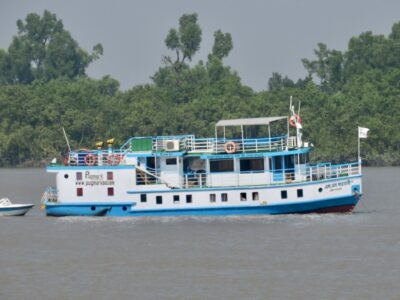
New York City Mayor Bill de Blasio’s claim during a recent blizzard that food delivery bikes were not emergency vehicles caused a small disruption in the City’s normally fast, abundant and inexpensive access to nearly any type of food from around the world. For major food companies that ensure this access, blizzards here or droughts in California increase costs, affect supply and demand, and change trade patterns.
Occasionally consumers in this global system notice these changes. Most remain unaware that the world relies more and more on monsoons in Thailand and sunny summers in Europe for rice and wheat eaten daily in dozens of countries.
Michael Puma, an associate research scientist with the Earth Institute’s Center for Climate Systems Research and an adjunct professor in Columbia’s Sustainability Management Program, considers what can happen when events such as long-lasting droughts or volcanic explosions interrupt production of these crops. He has begun to assess the fragility of the intricate network of trade relationships that move important basic food items across national borders.
In a recent paper, co-authored with Columbia colleagues Satyajit Bose and Benjamin Cook, Puma examines how major declines in the supply of staple crops from key exporting countries and the resulting price increases could impact international trade. I recently asked about his new research and its meaning for governments looking out for the food needs of their citizens. We met at his office within the quiet confines of the NASA Goddard Institute for Space Studies, near Columbia’s upper Manhattan campus.
Q: How did you get involved in research on how food is produced and distributed around the world?
A: My interest was initially to look at how extreme droughts might impact agriculture. There had been some work on the global food system as a network of interactions. Then my research became how resilient is the global food system to a generic disruption. There are a number of different disturbances that could affect agricultural output. If there is a major disruption in agricultural production in any given region, is our global food system resilient? If the answer to that is “no,” then the question we should be asking is, “What should we do to make it more resilient?“
I find that there has been a tendency to avoid thinking about major disruptions, I guess because people don’t want to worry about extremes or rare events. We hear a lot about climate change, and talk about how are we going to feed the world in 2050? But I think it is more critical to understand how the extremes impact agricultural production as a system of interconnected parts.
That is what my coauthors and I tried to get at in this paper. We did some very basic analysis as a way of getting a first-order estimate of what is going on and what we should expect and how we should deal with any major disruption.
How did you become interested in working on questions that involve both science and policy?
I went back and forth. I was originally in civil engineering, and then transitioned to environmental engineering. Then I went to SIPA, the international affairs school at Columbia, for environmental policy. But I wanted to bring a scientific or technical expertise into the policy world. So I went back for a PhD in more of an engineering discipline.
I worked with the United Nations Development Programme for several years on some of their climate-related projects, and . . . this food security research is my next effort in trying to link scientific/engineering knowledge with policy decisions. I think the food security and global food system topic is really ideal. Most policy makers don’t have the time or the background to understand the science, so they need people to be able to communicate that to them in an understandable way.
You and your co-authors make suggestions for government policy based on your findings. Can you describe how policymakers could improve resilience to prevent or reduce food shortages?
In a world that is more resilient to disruption, we would have a renewed focus on national food reserves. Of course, there is waste associated with food reserves. Yet, it is really critical to have food reserves whenever there is a disruption. Reserves cannot prevent all types of food shortages, but you would certainly rather have food stocks than nothing.
And we certainly want countries around the world to have greater self-sufficiency in terms of the staple foods such as rice and wheat. Some countries, of course, do not have the resources for that. But there are other countries that have an agricultural sector, yet they’ve shifted to cash crops, particularly in some of the developing countries. You don’t want to be so reliant on imports of your basic foods such that if global food prices spike, and you have shortages on the international markets, you are completely vulnerable.
But it is not enough to have food reserves and be self-sufficient. You have to also think of ways of distributing food. That really brings in the private sector. It is sometimes difficult to have data from large food companies and understand their distribution and logistics, but that is a really key piece of the puzzle in times of food shortage. You only have a small window of opportunity to get food to various places, and you really need that logistical support and distribution network in place. This is actually something that should be incorporated into national level strategy for security or for a sustainable future for a given country.
Current international development practice encourages countries to embrace free trade and looks down on subsidies that favor producers of less valuable crops. Do you think this is positive, because it promotes trade? Or is it detrimental to food self-sufficiency?
Well, I think there is a major flaw in that thinking. That view of trade would work if we were living in a world where countries don’t impose export restrictions in times of price spikes and food shortages. But we do live in a world where countries will act in that way. So, I think the international community has to go back and rethink things, particularly when it comes to the staple foods that are so important.
If you are advising a developing country on what is important for them to improve economically, you want to make sure you incorporate protection of their food security at the national level. You don’t want to go in there and tell them, “You should keep growing flowers and exporting flowers. Don’t worry about wheat and other grains, you can import them, because you’ll have plenty of money.” That is terrible advice, because if the prices of wheat skyrocket, and say the demand for flowers suddenly crashes, then they are in an insecure situation.
But your paper also suggests that increasing trade cushions countries from experiencing food shortages when small food supply problems happen. Could you talk about that role for international trade?
Trade is very beneficial. Trade prevents local disruptions. If you have a local drought, and you have lots of trade connections, you’ll be okay. Certainly if many countries didn’t have trade, you would see local famines much more frequently around the world. So trade is absolutely important. But we need some balance, especially when it comes to these staple foods.
Where do you want to go next in terms of research related to global food supply?
My next interest is to look at global food reserves, and to try and quantify, at least for the major exporters and consumers, the duration over which these food reserves would last. Do we have enough food reserves for three months? Four months? Under what conditions? I’m in the midst of analyzing that.
And I’m hoping to work with NASA’s food security program, using its remote sensing capabilities. NASA has this early warning system that tells the status of crops around the world. We want to link that with some of the economic or trade information that we have. If crop conditions are very unfavorable in a given region, who is dependent upon that region for imports? Of course I recognize the trade is very dynamic, but at least you have that sort of fundamental information, and I think that would help decision makers.




Congrats to you Kirstin. Good work. CLAUDIA DREIFUS